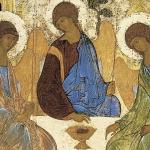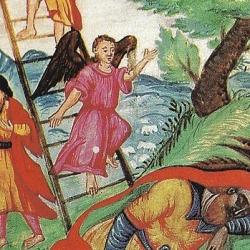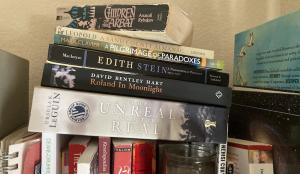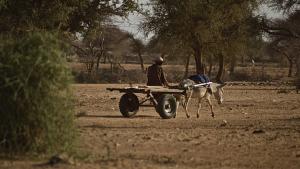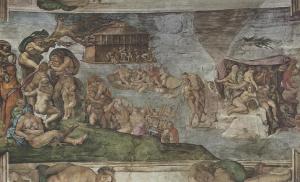
The Genesis flood: one of the archetypal stories of the Jewish and Christian scriptures. A text that’s been used to trace the beginnings of races, to combat scientific theories of evolution, and to demonstrate mysterious connections between distant religions and peoples of the ancient world.
The flood. We’re only 5 short chapters into the book of beginnings, and suddenly it all has to come to an end. God’s grief opens the gates of earth and the windows of heaven, and that lovely creation of chapter 1 is no more.
Rising Waters
It’s a complex story. Why destroy it all, if only humans are bringing God grief?
If I can offer a hint here of an exegesis before laying it aside for another time. I suspect we’re returning to chapters 1 and 2 here, and the two creation accounts. Humans were placed in God’s garden as faithful stewards and students of life. Now, without faithful namers and gardeners, the earth and all its inhabitants has gone feral.
Complexity aside though, we’ve got a story of destruction, and a story of the building of an ark large enough for all the kinds within creation to inhabit.
The rising waters in the days of Noah provide a rich metaphor throughout scripture. But today I want to suggest we take them quite literally. The planet is heating and the oceans are rising. The waters are rebelling against the limits God put on them in the first sentences of the Bible.
My question for us is this: is God calling us to construct holy spaces of belonging as the waters rise?
God’s Care
There is so much grief and destruction in these verses. I can’t imagine why we ever thought of this as a children’s story. Noah’s drunkenness at the end reminds us that even when it’s all doves and rainbows, the devastation is overwhelming. Even for God’s companion.
What a contrast with the attention to creation in those initial chapters, when God saw all that he’d made and over and over called it good.
However, I can’t help but notice God’s care all over this story. Notice the way he calls Noah to look after all the creatures. The birds, the beasts, all the different kinds. He even provides instruction for their feeding. God still cares for all that God has made.
And with his human creatures, it’s not just the kind, but persons he cares for. God and Noah walk together like friends. God looks on Noah con ojos buenos, a Spanish translation puts Genesis 6:8. “With kind eyes.” YHWH simply couldn’t let Noah and Noah’s family go.
God’s Care Extended
The Epistles of Peter in the New Testament take this mercy even further. Jesus preaches in hell to the victims of the flood. Noah’s family, the Epistle says, is saved through water as a kind of baptism. So this new/old baptism can even restore those who drowned that day when the floodgates broke.
The Petrine Epistles hint at a subtle and intriguing eschatology here. Final Judgment, they suggest, may in fact be the final judgment, or the end of judging itself. That is, punishment and suffering may be what lasts until that day, and then all tears are wiped away. But that too deserves more attention in a different place this this.
The flood story gives literal shape to the spaces in which Christians worship. The nave, from latin navis: ship. Notice the ribbed planking over your heads. We’re looking down into the seawalls of an ark. We’re being saved through water. These chapels and churches are spaces God has called us to build to keep the rising waters from overwhelming us.
Compassion and Wickedness During the Flood
Last year an exhibition of Michelangelo’s Sistine Chapel came to Austin. The centerpiece were giant prints of those famous ceiling frescoes, in detail that you could step up close to and study. The prophets and sybils, the arc of salvation history from creation to Last Judgment.
I was captivated by the way the artist tells the flood narrative. One image shows the ark afloat in the background as the waters rise. Also on the water is a small raft. Some people are scrambling to get on, others are beating them off with fists and clubs.
Then in the nearer foreground there are very different images. An old man brings a younger man’s limp body out of the water, and several arms reach out to help. Another bears an injured person on his back as they climb for higher ground. A child grabs at her mother’s leg for protection.
Michelangelo lets the flood show us humans at our worst, but also at our best. He makes it a story not just of wickedness, but also of care. He’s perhaps read those hints of divine mercy that I mentioned, and wants us to contemplate the possibility that the untold parts of the flood narrative might display human mercy as well.
Noah the Godlike
But some of that human care is in fact in the text itself. Notice what Noah’s calling here is. He walks with God, and so becomes accustomed to the strange ways that God speaks. The accent of a friend that you only come to understand by passing time with them. He also becomes accustomed to the strange things that God says. “Build an ark,” for instance. He catches the notes of divine grief mixed with compassion in this instruction. Think about the care, the imaginative attention, that the ship requires. Noah, God’s friend, builds a place where all the kinds can belong, and in doing so he becomes godlike in his care for the human and nonhuman animals.
God asked him to make a space where dogs and cats, peregrine falcons and pigeons could all coexist. The logistics alone overwhelm. That’s a lot of compassion on the part of Noah and is family.
Godlike compassion isn’t God’s alone—it becomes Noah’s character. And maybe even, in the imagination of Michelangelo, the character of others outside the boat.
The Gospel for An Age of Planetary Emergency
The Epistles of Peter help us remember that for all its horrors, this is an Easter story. The Good Friday of God’s creation is the path to Sunday morning.
And this story must become our gospel for an age of planetary emergency. The waters are rising. Creation is aligned for destruction. What shall we do?
The crisis
Some are identifying the root of this crisis in our attempts to exercise godlike dominion over creation. But I think we’re not godlike enough. Noah’s creativity and care had a source: he walked with God. What if that’s the big secret of human dominion over creation in Genesis 1: we get to live as images of God by constructing spaces of belonging for God’s good– very good –earth. Please, for the earth’s sake, be more godlike.
Now, some people are called to stem the tide. To mitigate the damage, perhaps reverse the trends. I hope and pray that God grants small and even great success to their work. And while many Christians are involved in these excellent projects, and so this problem-solving vocation is most certainly compatible with the general Christian vocation, I do not think this is the way to frame the latter.
All Christians need now to confront the very real possibility that it’s too late. That the end is upon us. We’re seeing the signs all around us: climate refugees leave lands that have turned to deserts. Others leave islands that are losing coastline, and seeing the fishing economy collapse. We’re now deep into the 6th mass extinction in our planet’s history. And this one we can’t blame on an asteroid.
How Shall We Then Live?
I think this text, this archetypal story of wickedness and compassion, the flood narrative, our gospel for an age of climate emergency, tells us all we need to know. And further, as a recent article on the great Evangelical apologist Francis Schaeffer noted, what we need to know about faithful Christian living in a time of emergency may turn out to transcend political divisions.
First, our calling is to walk with God. Get to know the strange way God talks and the strange things God’s says.
This will lead to strange practices that look about as ridiculous as building a boat in the middle of the desert. Worship. Attend a bible study. Sing in the choir. Bake communion bread. Give ourselves to acts of compassion like those Michelangelo painted on the Pope’s ceiling. Ask for forgiving our sins—like those other images he painted– even as we forgive those who sin against us.
Making a Way
In actions like these, we are constructing places of belonging. This is what Dr. J Kameron Carter, following Genna Rae McNeil and others, calls “waymaking.” Small acts of faithfulness that no one is going to build a monument to, but yet may show us how to be godlike. (My friend J and I disagree about the implications of this waymaking: he thinks it should replace dogmatic faith, but I’m still hoping that dogma can be a kind of waymaking.)
I hope you hear that I’m talking now about what Dr. King and others called “Beloved Community.” Holy spaces where all the kinds of earth and sea and sky can gather.
The calling to form such spaces is not the same as the calling to save the world or end the reign of the powers and principalities once and for all. We’ll need Michael and all his angels in the fight before we get all the way to that promised land. But our calling is to practice Godlike community in small ways. Think of scientists giving their lives to saving a single species of tropical frogs. They’re building a tiny little ark for one. That’s not going to stop climate change. But it might just show us what faithfulness looks like.
Holy Spaces of Belonging
The calling of all Christians now is to walk with God. And the calling of all faith leaders is to show us how. Call us, please, to practices of holiness, so that we can construct holy spaces of belonging for all the human and nonhuman kinds, even while the waters rise.
We must always remember that the flood story is an Easter story. It ends in a resurrection we can’t imagine yet. Far from letting us off the hook, though, that simply means we get to be imaginative in our ways of walking with the God of resurrection in this age of emergency.
We get to try out small experiments in waymaking that won’t solve anything: care for the widows and orphans of climate change. Tend a garden. Love a pet. Stop eating beef and chicken and pork from animals who have been treated like artificial machines rather than like God’s beloved creatures. Forgive someone who has hurt you. Reach out a hand to someone who is drowning.
Will any of this stop the flood? Absolutely not. But stopping the flood wasn’t Noah’s calling, and I don’t believe it’s ours. Not all of ours, anyhow. The Christian calling is to make a way where there is no way. To follow the waymaking God. To walk with God as Noah walked with God, and so be on hand to use our inspired imagination to do something ridiculous, foolish in the eyes of the world. Our calling is to construct holy spaces of belonging even while the waters rise.


